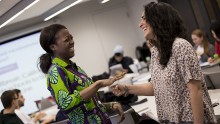Stephen Toope
Universities the world over have for centuries shared a common core mission: The preservation and dissemination of knowledge, and the creation of new knowledge. How that mission is fulfilled has evolved and will continue to evolve as the context changes. How it is best fulfilled will continue to be the subject of vigorous debate.
Today, some of the key questions are: To what extent should universities focus on producing students with specific technical skills required in the labour market? How much should be invested in educating well-rounded citizens who have mastered the critical skill of continuous learning to adapt in a rapidly changing world? What’s the right balance between exploratory research that lays the foundation for breakthrough innovation and a more immediately practical focus on applications of existing knowledge? How can we use technology to enrich learning while retaining the magic of people sharing experiences and ideas face-to-face?
We are grappling with all these questions at the Munk School of Global Affairs. While we don’t pretend to have definitive answers, I have strong opinions – particularly on two items.
The first is that I believe an ability to understand other cultures and develop relationships with people whose perspectives may seem “foreign” will serve our students well no matter what career path they choose. Some might call this a “soft skill.” I prefer “aptitude.” It’s about mindset and fluency of interaction with the world, not a checklist of do’s and don’ts. At the Munk School we’re very aware that real engagement doesn’t happen just by gathering diverse groups in a room and saying, “have at it”! We have been working to find the most effective ways to create productive intercultural dialogue that furthers thinking, builds common ground and contributes to solving the world’s problems.
Secondly, I believe how universities have traditionally thought about disciplines and sectors can get in the way of true understanding of complex social systems. At the Munk School, we have organized our teaching and research by region or theme in order to give students a thorough grounding of knowledge in that domain, but all our programs and centres also stress interdisciplinary studies and connection with the wider global picture. We understand that public, private, philanthropic and not-for-profit sectors may have different values and drivers, but we also know those boundaries are porous and differences are blurring (the rise of social enterprises as an example).
The phenomenon of Canadians engaging with the world is not new. There’s a 50+-year history of volunteers heading overseas, researchers partnering in international projects and universities providing study-abroad opportunities. One difference now is that the diverse world is no longer just “out there” but residing in major Canadian cities. There are vast opportunities for intercultural exchange right here, and to make this truly an exchange – not “us” taking Canadian expertise to “them”.
Another difference is that technology has made possible initiatives such as the “Global Classroom.” As conceived by Teresa Kramarz, director of the Munk One program, this program will enable students on different continents to engage in robust collaboration on projects without leaving home. For those for whom it’s possible, I would still encourage international exchanges and internships that provide more in-depth cultural understanding and opportunities to work with global teams on important projects.
These are strange times. As the global economy becomes ever more inextricably intertwined on most fronts, we’re simultaneously seeing the populist rise of protectionism and “us first.” In this context, I believe the Munk School can best fulfil its mission by forming international partnerships, creating venues that promote intercultural exchange, and equipping our students to engage fully with the world.
February 6, 2016
